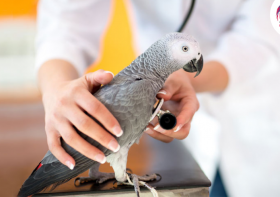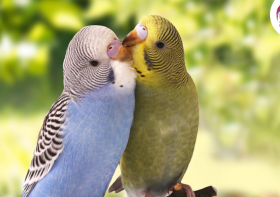How Do I Stop Feather Loss For My Parrot?

Feathers are the most delicate part of the body of any bird and when they are compromised, it can be problematic. Feather loss is something that all bird owners fear. It can be routed to several causes such as feather plucking, malnutrition, and stress. Sometimes the problem is easily treated while other times it’s more difficult. There are several causes for this but the thing to remember is that you shouldn’t panic when it does. It is important that you are aware of the causes of this so that either you can avoid it or venture to treat it. Here are a few simple things that you can do at home to minimize feather loss and encourage feather growth in parrots.
- What causes feather loss in parrots?
Parrots can lose feathers for several reasons. Common causes include:
- Moulting
- Lack of healthy and balanced feed
- Stress
- Boredom and other psychology-related issues
- Mites, Lice, Bacterial, Viral and Fungal infections
- Hormonal imbalances
- Vices like feather plucking
How to stop feather loss in parrots?
If you catch the root cause of feather plucking in time and the feather loss is stopped in its track, your parrot will grow new feathers. Remember that it is not an overnight process. With proper care and health monitoring, it takes a few months or years for your feathery friend to look like their old selves. Let us now look into the ways to stop feather loss in parrots.
- Feed your parrot a healthy and balanced diet – A healthy and balanced diet plays a vital role in the health and well-being of birds. An optimum, balanced avian diet must include a bountiful, rich selection of fresh vegetables and fruits, nuts, herbs, seeds, pellets, and sprouts. Make sure to feed your parrot a healthy and balanced diet. Avoid foods with high salt, sugar and fat, fried food, tea and coffee.
- See to it that your parrot is housed in a healthy environment – Parrots need to be housed in a healthy environment. Ensure that the environmental conditions such as sunlight, humidity and room temperature where your bird is housed meet your parrot’s requirements for its optimal health. Also make sure that the cage is placed in an environment that is free from toxic fumes such as aerosol sprays, insecticide sprays, tobacco fumes and cigar smoke.
- Make sure that your parrot gets a good sleep – Ensuring that your parrot gets good sleep is one of the most important things that you can do for its health and disposition. Make sure that your parrot gets at least 8 to 10 hours of undisturbed sleep daily by reducing the amount of light and disturbances due to external noise good sleep keeps your parrot away from stress, boosts body metabolism, and contributes to the welfare of your parrot.
- Provide toys and interact with your parrot regularly to avoid boredom – Never let your parrot feel lonely or bored. Provide toys and interact with your parrot regularly to make sure that it does not feel left out. Parrots are social animals and need frequent interaction with their owners. Spend quality time with your parrot and if you have to leave your bird alone at home, ensure that you leave a radio or TV on or consider getting him an avian friend to interact with in your absence.
- Under the root cause of and treat the cause not the symptom – Figuring out the root cause for feather loss helps in treating feather loss in your parrots. Determine the underlying cause of the problem before going ahead to find the solution. Tackle the root cause of the feather loss problem, rather than just treating its symptoms. This helps you in solving the problem in the long term rather than just the short term.
- Time to contact your birdie’s vet – When your diet and environment are set right and you are confident that your feather friend is out of stress and still feather loss persists have a visit to your vet immediately to identify the route cause and initiate therapy.
Healthy feathers contribute to the overall health and well-being of birds. It is very important to always keep your birdie’s feathers healthy and strong. You can do this by providing a balanced diet and plenty of exercise for your birdie. We hope you found the information you were looking for and if you have any other questions about keeping your bird healthy, do not hesitate to contact us anytime. We are always here for you and your feather friend!
Deprecated: ltrim(): Passing null to parameter #1 ($string) of type string is deprecated in G:\PleskVhosts\spinzsuntanremover.com\redbellydiagnostics.com\blogs\wp-includes\wp-db.php on line 3031
Deprecated: Creation of dynamic property WP_Term::$object_id is deprecated in G:\PleskVhosts\spinzsuntanremover.com\redbellydiagnostics.com\blogs\wp-includes\class-wp-term.php on line 198
Deprecated: Creation of dynamic property WP_Term::$object_id is deprecated in G:\PleskVhosts\spinzsuntanremover.com\redbellydiagnostics.com\blogs\wp-includes\class-wp-term.php on line 198
Deprecated: Creation of dynamic property WP_Term::$object_id is deprecated in G:\PleskVhosts\spinzsuntanremover.com\redbellydiagnostics.com\blogs\wp-includes\class-wp-term.php on line 198
Deprecated: Creation of dynamic property WP_Query::$comments_by_type is deprecated in G:\PleskVhosts\spinzsuntanremover.com\redbellydiagnostics.com\blogs\wp-includes\comment-template.php on line 1525




Leave a Reply